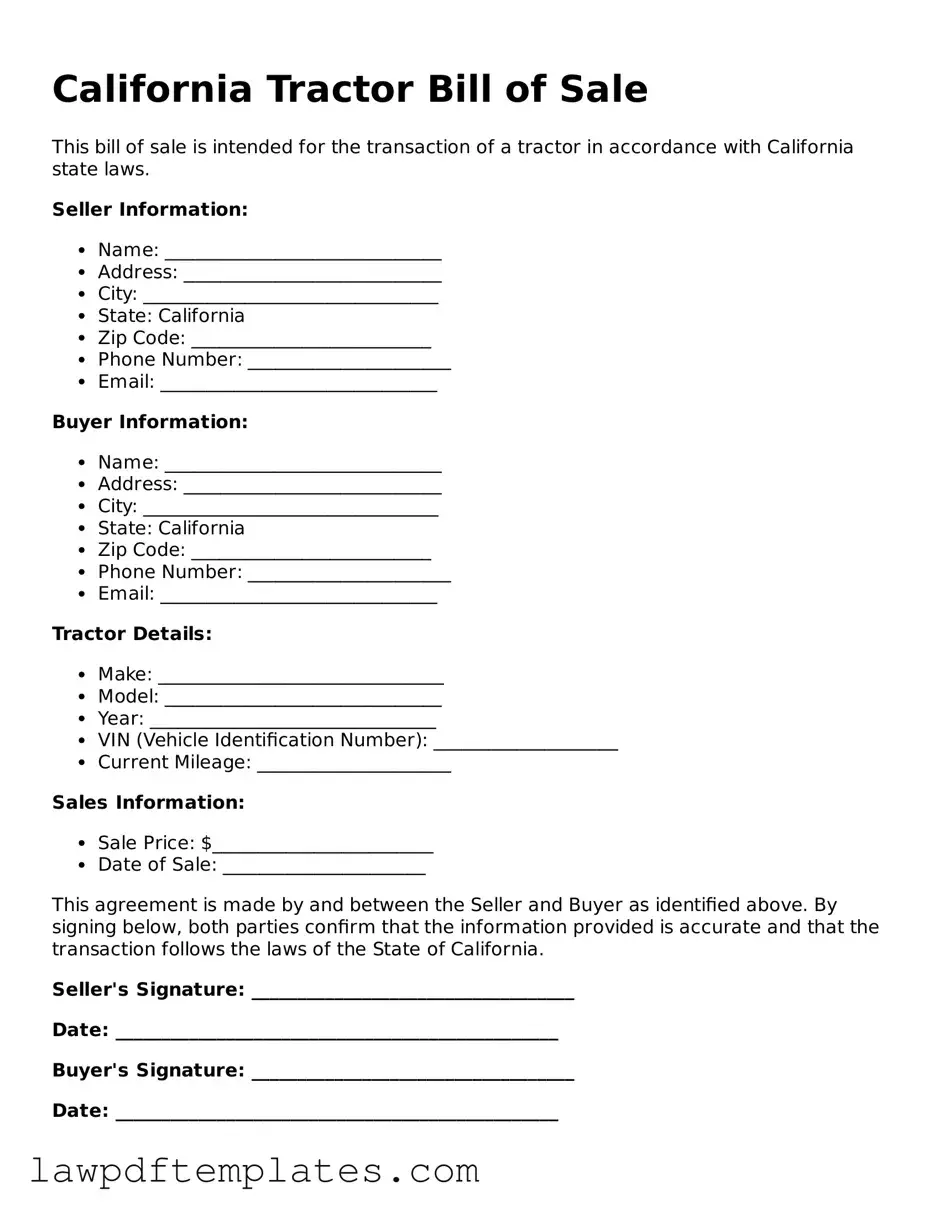Free Tractor Bill of Sale Template for the State of California
Form Breakdown
| Fact Name | Description |
|---|---|
| Purpose | The California Tractor Bill of Sale form is used to document the sale and transfer of ownership of a tractor in California. |
| Governing Law | This form is governed by California Vehicle Code Section 5601, which outlines requirements for vehicle transfers. |
| Seller Information | The seller must provide their name, address, and signature to validate the sale. |
| Buyer Information | The buyer's name and address must be included to officially record the new ownership. |
| Vehicle Details | The form requires specific details about the tractor, including make, model, year, and Vehicle Identification Number (VIN). |
| Date of Sale | The date when the sale occurs must be clearly indicated on the form. |
| Notarization | While notarization is not always required, it can add an extra layer of authenticity to the document. |
Sample - California Tractor Bill of Sale Form
California Tractor Bill of Sale
This bill of sale is intended for the transaction of a tractor in accordance with California state laws.
Seller Information:
- Name: ______________________________
- Address: ____________________________
- City: ________________________________
- State: California
- Zip Code: __________________________
- Phone Number: ______________________
- Email: ______________________________
Buyer Information:
- Name: ______________________________
- Address: ____________________________
- City: ________________________________
- State: California
- Zip Code: __________________________
- Phone Number: ______________________
- Email: ______________________________
Tractor Details:
- Make: _______________________________
- Model: ______________________________
- Year: _______________________________
- VIN (Vehicle Identification Number): ____________________
- Current Mileage: _____________________
Sales Information:
- Sale Price: $________________________
- Date of Sale: ______________________
This agreement is made by and between the Seller and Buyer as identified above. By signing below, both parties confirm that the information provided is accurate and that the transaction follows the laws of the State of California.
Seller's Signature: ___________________________________
Date: ________________________________________________
Buyer's Signature: ___________________________________
Date: ________________________________________________
It is highly recommended for both parties to keep a copy of this bill of sale for their records.
Common mistakes
When filling out the California Tractor Bill of Sale form, individuals often make several common mistakes that can lead to complications down the line. One frequent error is failing to provide accurate information about the tractor itself. This includes details such as the Vehicle Identification Number (VIN), make, model, and year of manufacture. Omitting or misreporting this information can create confusion and may even hinder the registration process.
Another mistake involves the seller's and buyer's information. It's crucial that both parties provide their full names, addresses, and contact details. Incomplete or incorrect information can lead to disputes later, especially if ownership needs to be verified. Additionally, people sometimes neglect to include the date of the sale, which is vital for establishing a timeline for the transaction.
Many individuals overlook the importance of signatures. Both the seller and buyer must sign the form to validate the transaction. Without these signatures, the document may not hold up in legal contexts. Furthermore, some people fail to have the document notarized, which can add an extra layer of authenticity and may be required for certain transactions.
Another common issue arises from the payment section. Buyers and sellers should clearly state the sale price and the method of payment. Failing to do so can lead to misunderstandings about the terms of the sale. It’s also important to specify whether the sale is contingent upon any conditions, such as passing a mechanical inspection.
People often ignore the importance of keeping a copy of the completed bill of sale. This document serves as proof of the transaction and can be useful for both parties in case of future disputes. Without a copy, individuals may find themselves in a difficult position if questions about ownership arise.
Additionally, some individuals do not check for any outstanding liens on the tractor before completing the sale. If a lien exists, the buyer may face unexpected legal complications. It’s advisable to ensure that the tractor is free of any financial encumbrances prior to finalizing the sale.
Another mistake is not understanding the implications of the sale. Sellers should be aware of their responsibilities regarding disclosures about the tractor's condition. Failing to disclose known issues can lead to legal repercussions. Buyers, on the other hand, should ensure they understand what they are purchasing, including any potential liabilities.
Finally, individuals sometimes misinterpret the purpose of the bill of sale itself. It is not just a formality; it is a legal document that can affect ownership rights. Understanding its significance can help both parties approach the transaction with the seriousness it deserves.
Discover More Tractor Bill of Sale Templates for Specific States
How to Transfer Ownership of a Tractor - Provides a formal record that can be used in disputes.
A Virginia Motor Vehicle Bill of Sale form is a legal document that records the sale and transfer of a vehicle from one party to another. This form serves as proof of ownership and includes important details about the vehicle and the transaction. To ensure a smooth transfer, take the time to fill out the form accurately by clicking the button below, or visit PDF Documents Hub for more information.
How to Transfer Ownership of a Tractor - Clarifies details surrounding exclusions or included accessories.
